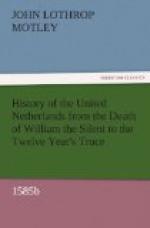Ten days afterwards, the magistrates, thus addressed—after communication with the broad-council—answered Parma’s. 23rd Nov., letter manfully, copiously, and with the customary but superfluous historical sketch. They begged leave to entertain a doubt as to the paternal sweetness of a king who had dealt so long in racks and gibbets. With Parma’s own mother, as they told the Prince, the Netherlanders had once made a treaty, by which the right to worship God according to their consciences had been secured; yet for maintaining that treaty they had been devoted to indiscriminate destruction, and their land made desolate with fire and sword. Men had been massacred by thousands, who had never been heard in their own defence, and who had never been accused of any crime, “save that they had assembled together in the name of God, to pray to Him through their only mediator and advocate Jesus Christ, according to His command.”
The axis of the revolt was the religious question; and it was impossible to hope anything from a monarch who was himself a slave of the Inquisition, and who had less independence of action than that enjoyed by Jews and Turks, according to the express permission of the Pope. Therefore they informed Parma that they had done with Philip for ever, and that in consequence of the extraordinary wisdom, justice, and moderation, of the French King, they had offered him the sovereignty of their land, and had implored his protection.
They paid a tribute to the character of Farnese, who after gaining infinite glory in arms, had manifested so much gentleness and disposition to conciliate. They doubted not that he would, if he possessed the power, have guided the royal councils to better and more generous results, and protested that they would not have delayed to throw themselves into his arms, had they been assured that he was authorized to admit that which alone could form the basis of a successful negotiation— religious freedom. They would in such case have been willing to close with him, without talking about other conditions than such as his Highness in his discretion and sweetness might think reasonable.
Moreover, as they observed in conclusion, they were precluded, by their present relations with France, from entering into any other negotiation; nor could they listen to any such proposals without deserving to be stigmatized as the most lewd, blasphemous, and thankless mortals, that ever cumbered the earth.
Being under equal obligations both to the Union and to France, they announced that Parma’s overtures would be laid before the French government and the assembly of the States-General.
A day was to come, perhaps, when it would hardly seem lewdness and blasphemy for the Netherlanders to doubt the extraordinary justice and wisdom of the French King. Meantime, it cannot be denied that they were at least loyal to their own engagements, and long-suffering where they had trusted and given their hearts.




